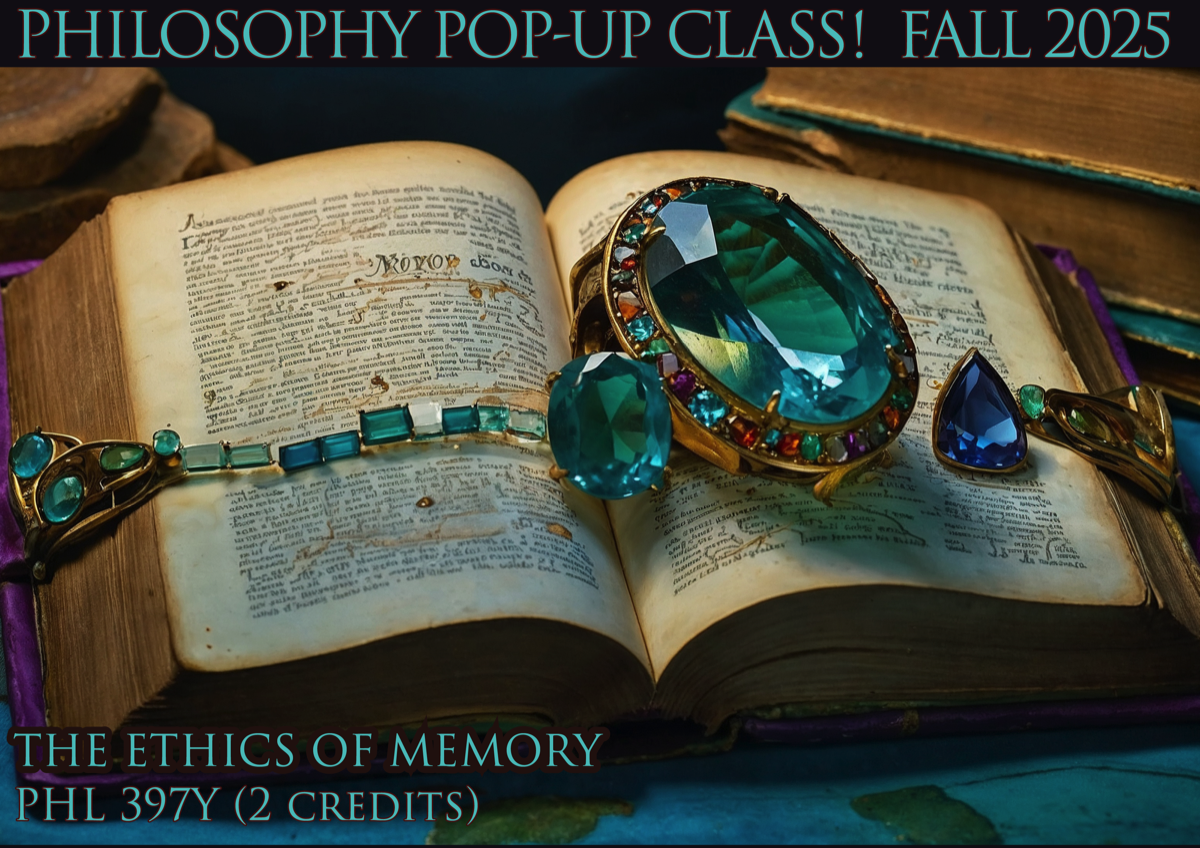
What is a Pop-Up Class?
A pop up class is a 1-2 credit academic experience that is offered on a specific topic, often outside of the regular academic schedule. Pop Up classes are designed to be flexible and responsive to current events, trends, or student interests.
This class is PHL397, but I have minimal experience with philosophy, will I be lost?
Not at all. This is a highly interdisciplinary class that will introduce you to an area of philosophy known as “ethics”. You will learn how this important area of philosophy is applied to the real world, with a focus on how we apply ethical premises to law and policy connected to our “duty to remember”. For example, the laws governing Wills and Trusts (aka “estate law”) presume that the final wishes of someone matter. Why do we presume this? We will discuss. We will also discuss how the United States, unlike many other countries, is committed to a full accounting of all soldiers who go missing and remained “unaccounted for”.
Who is Teaching this class?
This class is designed and taught by Dr. Hope Elizabeth May, a professor in the Department of Philosophy, Anthropology and Religion. Dr. May has taught in South Korea (at the Graduate Institute of Peace Studies), has lectured internationally, and works in an emerging interdisciplinary field which she calls “peace and justice history” or “positive history”. Peace and justice/Positive History is not just history, though. It also involves philosophy and other disciplines such as law, politics and even literature. Dr. May is also an attorney, and she started to develop “positive history” when she began learning about the history of Public International Law in The Hague, Netherlands over a decade ago.
Books? Field Trips? Guest Speakers?
There will be a couple of “field trips” (in Mt. Pleasant), as well as guest speakers. The text will be given to you as a gift, thanks to the generosity of Stephen “Van” Grubb, whose father went MIA in the Vietnam War in 1966. That event transformed Van’s mother, Evelyn Grubb (1931-2005), into a foremost activist. During a time when married women could not get a credit card without their husband’s consent, Evelyn learned about the Geneva Conventions and the Universal Declaration of Human Rights and she labored with other families to remind the international community about these obligations. You will learn directly from Van and others connected to this issue.
When does the class meet?
When does the class meet?
The class does NOT meet for the entire Fall 2025 semester, but only from September 5 to October 10, 2025. We will meet on Monday evenings (5:00-6:15pm), and some (two to three) Friday afternoons (1-3pm), and on one important Saturday (September 19). We will meet both in person and online. Think of our sometime Friday meetings as occasional “lab days” which will involve a local field trip or two, a zoom session with a guest speaker, etc.
The class does NOT meet for the entire Fall 2025 semester, but only from September 5 to October 10, 2025. We will meet on Monday evenings (5:00-6:15pm), and some (two to three) Friday afternoons (1-3pm), and on one important Saturday (September 19). We will meet both in person and online. Think of our sometime Friday meetings as occasional “lab days” which will involve a local field trip or two, a zoom session with a guest speaker, etc.
What will I learn?
What will I learn?
You will learn how numerous disciplines are involved answering the questions:
Who and what ought we remember?, What do we owe the past?, Are there certain narratives that we, as individuals, have a duty to know?, Are there certain duties of states to “own up” and educate others about is past mis-deeds? Germany does this and even has coined a unique word, “Vergagenheitsbewältigung,” which is the practice of facing, remembering, and overcoming a difficult past. We will discuss this and similar notions related to the Ethics of Memory. The class will also highlight stories connected to the U.S. Department of Defense’s mission to recover and account for all U.S. soldiers. Not every country does this. Why does the U.S. do it, and how did it come about? You will learn the answers to these questions, among many others!
You will learn how numerous disciplines are involved answering the questions:
Who and what ought we remember?, What do we owe the past?, Are there certain narratives that we, as individuals, have a duty to know?, Are there certain duties of states to “own up” and educate others about is past mis-deeds? Germany does this and even has coined a unique word, “Vergagenheitsbewältigung,” which is the practice of facing, remembering, and overcoming a difficult past. We will discuss this and similar notions related to the Ethics of Memory. The class will also highlight stories connected to the U.S. Department of Defense’s mission to recover and account for all U.S. soldiers. Not every country does this. Why does the U.S. do it, and how did it come about? You will learn the answers to these questions, among many others!
Other questions? Email Dr. Hope Elizabeth May HERE.
©2025 Hope Elizabeth May